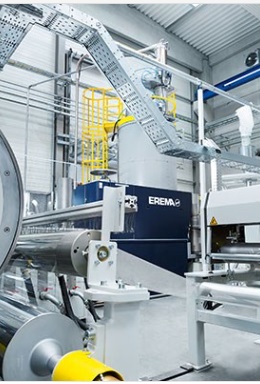
One year ago, Erema, Ansfelden, Austria, announced the relaunch of the Multi-Purpose Reactor (MPR) at Discovery Day. Since then, the trend toward food-contact-grade direct processing of polyethylene terephthalate (PET) products has continued to grow, the equipment maker says. More customers are enhancing their existing extrusion plants by adding food-contact compliance.
Nearly 1.3 million metric tons of PET are recycled worldwide per year with Vacurema technology from Erema, the company says. The end products include food-contact-compliant preforms for the beverage industry, thermoforming sheet, fiber and strapping.
According to Erema, its order figures show that the trend in PET recycling is toward direct processing, meaning the intermediate step of pellet prediction is eliminated and postconsumer PET flakes or production scrap are processed directly and in one step to make products. Twenty-four of these Vacurema Inline systems have been shipped in the last 15 months alone and, additionally, a new process for the direct production of food-contact-grade preforms from postconsumer bottle flakes has been presented, according to the equipment manufacturer.
Erema also offers the MPR, a crystallization dryer, for customers that are converting their existing PET extrusion plants to produce food-contact-compliant products. The decontamination, drying, dedusting and crystallisation of different PET input materials takes place in just one step in preparation for extrusion, the company says.
“The MPR is becoming increasingly popular for customers who have a conventional crystallizer and predryer and are confronted with long process times and high operating costs,” says Christoph Wöss, business development manager for the bottle sector at Erema. “With energy consumption at only 0.1 kilowatt hours per kilogram, the MPR is a crystallizer and predryer at the same time, making it the economically interesting alternative.”
Input materials, such as washed PET bottle flakes, ground PET flat sheet scrap, virgin PET material plus mixtures of them are decontaminated and food-contact-compliant before extrusion, the company says.
“The list of alternative suppliers of these PET extruders without pretreatment is long and tempting. However, later investments in dryers or high-maintenance decontamination modules reduce the profits of the PET producers in the end,” Wöss says.
“We at Sky-Light place our trust in the MPR from Erema when it comes to the food-contact-compliance of PET—and this is already the second time,” Sky-Light owner Søren Larsen. “In the new expansion of our production capacity, we once again added an MPR to the twin-screw extruder. The growth in output through the increase of the bulk density of PET flakes and flat sheet waste and the stable IV value are more than convincing from the point of view of an entrepreneur.”
Sky-Light is a specialist for individual packaging solutions. The Danish company produces several hundred million snap-on lids, cups, inserts, blister and transport trays for customers in the food, electronics and pharmaceutical industry.
The technical and economical improvements of the relaunched line include the ability to reduce the connected load by more than 30 percent while maintaining output, Erema says.
“The calculable operating costs in combination with the reliable output performance make for a foreseeable and short amortisation period,” says Alimpet President Roberto Alibardi.
The Italian company—part of the Aliplast Group—makes thermoforming sheet from postconsumer PET, which is then used to make thermoforming containers for the food industry, for example. Besides two MPRs, the Aliplast Group also has Vacurema systems from Erema to produce food-contact-grade PET recyclates.
Additionally, the relaunch included a higher degree of automation and improved ease of maintenance with the vacuum system, Erema says. The process water tank has been replaced by a utility-free vacuum pump, which reduces operating costs. The compactness of the system has been reworked, reducing its footprint by 20 percent.
Erema MPR Vacurema Technologies Erema MPR Vacurema Technologies Erema MPR Vacurema Technologies Erema MPR Vacurema Technologies
Erema MPR Vacurema Technologies Erema MPR Vacurema Technologies Erema MPR Vacurema Technologies Erema MPR Vacurema Technologies
